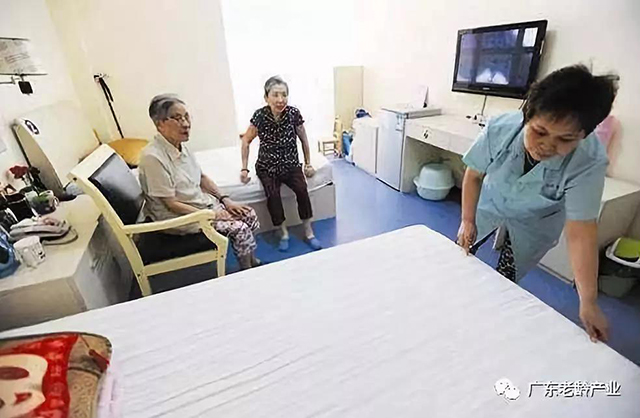Open the wisdom platform for home care services in Guangzhou, the number of applicants for food distribution in the city, the number of elderly canteens, and the objects of home service support can be clearly seen. With this platform, the resources of Guangzhou's aged care services can be rationally integrated, and the home care service institutions can be effectively improved. Management level. This is the embodiment of Guangdong Province to explore smart old age and improve the quality of old-age services.
By the end of 2018, the registered population of residents aged 60 and over in Guangdong Province was 14.4 million, accounting for 15.2% of the total registered population. In order to cope with the aging of the population, Guangdong Province has fully played its leading role in the government and supported social forces to become the market mainstay of the elderly care service. Starting from the aspects of policy creation, service provision, old-age welfare and quality improvement, we will promote the home-based and community-based The establishment of a multi-level old-age service system that combines the full development of the institution and the combination of medical care, and strives to create the “most beautiful sunset red” that the old people have.
Expand service delivery: 34 old-age beds for every 1,000 elderly people
In recent years, Guangdong Province has continuously expanded the supply of aged care services by improving pension policies, increasing capital investment, and supporting the development of private pension institutions. At present, there are 1,78 old-age care institutions in the province, with 489,000 old-age beds and 34 old-age beds for every 1,000 elderly people. There were 49,200 old-age service facilities in urban and rural communities across the province, of which the coverage rates of urban, township and rural areas reached 97.1%, 96.1% and 91% respectively.

In order to improve the service guarantee for the elderly, Guangdong Province has established the old age allowance, old-age service subsidy and nursing subsidy system. The 21 prefecture-level cities in the province have established a universal subsidy system for senior citizens over 80 years old, which has become the national senior subsidy system for Tianjin. The province with the widest coverage and the largest number of elderly people.
In terms of medical care, the proportion of medical services provided by the province's old-age care institutions reached 76%. By the end of 2018, there were 138 medical and nursing institutions in the province, and 90% of medical institutions have established green channels for convenient services such as registration and medical treatment for the elderly.
Promote home care for the elderly: start the community elderly dining hall
Guangdong Province vigorously promotes the comprehensive reform of the national pension service industry, the national home and community pension service reform pilot work, and the community-based “household pension” for community home care in the pilot work, the public pension institution occupancy assessment system and the old-age service society Organize three reform experiences of philanthropy ventures, and incorporate them into the reform experience of the provincial party committee deep reform group, focusing on the replication and promotion in the Pearl River Delta region.
At present, more than 1,200 catering outlets have been set up in the cities of the Pearl River Delta to carry out residential care services for the home community with the focus on food assistance, and to promote the diversified, professional, large-scale and personalized development of the aged care services in the home community.

Image from the network
Encourage social participation: strengthen cooperation in pension services between Guangdong, Hong Kong and Macao
In recent years, Guangdong has fully liberalized the old-age service market, encouraged social forces to enter, and developed the old-age service industry as an important measure to actively respond to the aging of the population and a new kinetic energy to promote economic and social development.
Since the beginning of this year, Guangdong Province has cancelled the establishment of a license for the old-age care institutions. After the registration of the old-age care institutions, they only need to go to the civil affairs department for the record. At the same time, foreign investors are encouraged to set up old-age care institutions. Hong Kong and Macao service providers enjoy the same treatment in the establishment of pension institutions in Guangdong and private pension institutions in the Mainland.
In response to difficulties in land use and financing difficulties, Guangdong Province actively promoted the optimization and adjustment of the supply structure of old-age care services and guided social capital into the pension service market. In June this year, the Provincial Civil Affairs Department compiled and published the “Guangdong Provincial Pension Service Investment Support Policy List”, which included 26 investment support measures including land use, planning and construction, taxes and fees, and medical care.
In strengthening the cooperation between the Hong Kong and Macao pension services, there are currently four Hong Kong service organizations and individuals to set up five old-age care institutions in Guangdong in the form of sole proprietorship or joint venture, providing more than 2,000 old-age beds. In addition, Guangdong Province is exploring the establishment of a joint-stock sharing mechanism for the elderly services in Guangdong, Hong Kong and Macau, and further strengthening the cooperation among Guangdong, Hong Kong and Macao in terms of personnel, capital and projects to further optimize the market environment, encourage product innovation and promote the development of aged care services. .
Article source: Nanfang Daily
相关推荐
- Shaanxi holds the second quarter government bank enterprise docking meeting for the elderly care industry 2025-06-28
- Announcement of Volunteer Recruitment for the "Silver Age Action" in the New Era of Xi'an City 2025-06-04
- Xi'an, Shaanxi: Welfare policies for the elderly are all here 2025-05-22
- Notice from the Civil Affairs Bureau and Finance Bureau of Xi'an City on Promoting the Promotion and Application of Smart Health Elderly Care Products 2025-04-11

